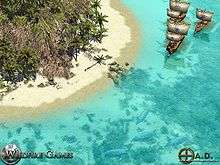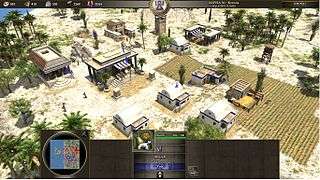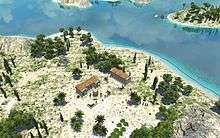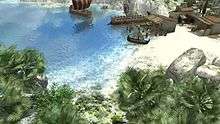0 A.D. (video game)
| 0 A.D. | |
|---|---|
 | |
| Developer(s) | Wildfire Games |
| Publisher(s) | Wildfire Games |
| Composer(s) | Omri Lahav |
| Engine | Pyrogenesis |
| Platform(s) | Microsoft Windows, OS X, Linux |
| Release date(s) |
November 8, 2016 (Alpha 21) |
| Genre(s) | Real-time strategy |
| Mode(s) | Single-player, multiplayer |

0 A.D. is a free, open-source, cross-platform real-time strategy game under development by Wildfire Games. It is a historical war and economy game focusing on the years between 500 B.C. and 1 B.C. for the first part, and a planned second part for the years 1 A.D. to 500 A.D.[1][2] The game is cross-platform, playable on Windows, OS X, Linux, and OpenBSD.[3] The game aims to be entirely free and open-source, using the GPL 2+ license for the game engine and CC BY-SA for the game art.
History
0 A.D. originally began as a comprehensive total conversion mod concept for Age of Empires II: The Age of Kings in June 2001. With limited design capabilities, the team soon turned to trying to create a full independent game based on their ideas.[4][5][6] The game has been in development since 2000, with actual work starting in 2003.
In November 2008, the developers confirmed that they would soon be releasing the project as open-source.[7] On 10 July 2009, Wildfire Games released source code for 0 A.D. under the GPL 2+, and made the art content available under the CC BY-SA.[8][9][10][11]
There were about ten to fifteen people working on 0 A.D. around 23 March 2010, but since development started there have been over 100 people who have contributed.[12]
On 5 September 2013, an Indiegogo crowdfunding campaign was started with a US$160,000 goal. They raised a total of US$33,251, to be used to hire a programmer.[13][14] The majority of the finances are managed by the Software in the Public Interest organisation.
There is no official release date set for the finished version.[15]
Game engine

Pyrogenesis (from Greek pyr, "fire" and genesis, "origin, beginning") is the name of 0 A.D.'s game engine currently under development.[16] It was originally named Prometheus, after the Greek mythological character who stole fire from the gods, for the use of mankind. That name was changed in 2004, after another development team advertised the use of the name Prometheus for their own game.
Pyrogenesis is mostly written in C++ and uses Mozilla's SpiderMonkey JavaScript engine for scripting.[16] It also uses such open-source libraries as OpenGL, OpenAL, Boost, SDL, Vorbis and wxWidgets. It supports open data formats such as COLLADA, XML and JSON. It is cross-platform, supporting Windows, OS X, Linux and various Unix-like OSes.
Gameplay
 |
Honor Bound (0 A.D. Main Theme)
Main theme of 0 A.D. |
| Problems playing this file? See media help. | |
0 A.D. features the real-time strategy gameplay components of building a base, training an army, combat, and technology research.[17] The game is about economic development and warfare.[2] The game will include multiple units and buildings specific to each civilization as well as both land and naval units.[18]
There are twelve different civilisations available, which are each represented as they were at their top. During the game, the player will not advance through time, but from village phase over town phase to city phase. Where the phases represent the sizes of settlements in history. Every phase unlocks new units, buildings and technologies.
Modes
The game features both a singleplayer and a multiplayer mode. In singleplayer mode, the player's opponents are controlled by the game. In both modes, players can choose between computer-generated random maps, hand-made scenarios, or skirmish maps as a hybrid form.
Multiplayer functionality is implemented using peer-to-peer networking without a central server.[19] There is, however, a central lobby server which can be used to discover other players and set up a game. Players can also bypass the lobby and connect directly to each other using their IP address. When players connect to each other, one player's computer acts as a host. The host gathers commands from all players and distributes them. Sending just the players' commands reduces the amount of data that midst be sent, which reduces delays due to slow network connections. However, all connected players must calculate the entire game state from those commands, which means that the game can only be as fast as the slowest computer in the game can handle.
Civilizations


0 A.D. allows the player to control any of twelve ancient civilisations from antiquity.[20]
| Civilizations |
Technologies
Technologies can mostly be researched at buildings to which they are related. Technologies generally modify the statistics of certain units of buildings, to make them better at a certain task (economical, military, ...).
Starting technologies are generally cheap, but expose more advanced and more expensive technologies. Researching the right technologies at the right time is critical to win. When a technology is being researched at a building, the building cannot produce units during that time.
Units
Most units in the game are land units.
This game features units that are both of economical and military importance. So called citizen-soldiers. This was done to reflect history, as only few people were full-time professional soldiers. Citizen-soldiers can upgrade, which makes them better at military tasks, but worse at economical tasks. Female citizens can only perform economical tasks, while champion units can only perform military tasks.
Siege units are mostly mechanical units like rams or catapults, though some civilisations can also use elephants as siege units. Siege units are effective against buildings, but too slow and expensive to be used against regular units. Healers are units that can regenerate the health of other units, however, they are vulnerable units otherwise. Traders can follow a trade route between markets and docks of a player and his allies. Traders generate resources when arriving at a market. Long trade routes makes trading more profitable, but also makes it more difficult to defend the trade route.
Next to the regular land units, there are also heroes. Heroes represent specific historical person like a famous general or political leader. These heroes are the strongest units, often having an "aura" that improves the characteristics of other units. A player can only own one hero at a time.
Ships are also considered units and can perform different tasks. Fishing ships can gather food in the form of fish, merchant ships are the nautical alternative to traders, and other ships are designed for naval battle or troop transport.
Buildings
Buildings, unlike units, can't be moved once they are built.
The main starting building is the Civil Centre. This building is a rather generic building that serves multiple purposes. It can produce basic units, research some technologies (like the phase upgrades), offer protection during an early attack and act as a dropsite for all resources. The civil centre is also the territory centre. It causes a player-owned territory around the building, in which other buildings can be constructed. Other buildings are normally specialised to a certain category like dropping of resources, defending, producing units or researching technologies.
Development

The idea of 0 A.D. started around the year 2000. At the start, it was just a modding project that would make use of the Age of Empires engine. However, different modders bumped into the limitations of using a closed-source engine, so they decided to cooperate and make a game from scratch.
Between 2002 and 2009, the game was developed in private. Only people who were accepted to the team had access to the source code. During that time, a lot of artwork was made, but it was difficult to find programmers for a closed-source model. In 2009, the team re-evaluated the development process, and chose for the open-source development model. Shortly after open-sourcing the game, the team also started to release development versions of the game.[21]
Since open-sourcing the game, it has seen a large amount of contributors. But is still under heavy development.
Reception
0 A.D. was voted one of the Top 100 Best Upcoming Mods and Indies of 2008 by Mod DB.[22] For 2009, it made it in the Top 100 Best Upcoming Mods and Indies again,[23] as well as winning third place for Player's Choice Upcoming Indie Game of the Year.[24] For 2010, 0 A.D. received an honorable mention for Player's Choice Upcoming Indie Game of the Year,[25] and came second in that competition for 2012.[26] 0 A.D. has been generally well received.[27] It was voted by fans as the SourceForge project of the month for June 2012.[28] It was voted as LinuxQuestions.org Open Source Game of the Year for 2013.[29]
See also
References
- ↑ Yaron, Oded (8 August 2010). "0AD: לוקחים את ההיסטוריה ברצינות" [0 A.D.: Taking History Seriously] (in Hebrew). Ha'aretz. Retrieved 21 July 2011.
- 1 2 McElroy, Justin (13 July 2010). "The Joystiq Indie Pitch: 0 A.D.". The Joystiq Indie. Retrieved 17 July 2011.
- ↑ Tozzi, Christopher (13 October 2009). "0 A.D. Promises Real Gaming for Ubuntu". The Var Guy. Retrieved 17 July 2011.
- ↑ Adams, Jason (14 June 2006). "A First-Look at 0 A.D.". GameDev.net. Archived from the original on 29 June 2011. Retrieved 21 July 2011.
- ↑ "Official FAQ – How long has 0 A.D. been in development?".
- ↑ Domps, Baptiste (22 March 2011). "Wikinews interviews 0 A.D. game development team". Wikinews. Retrieved 15 July 2011.
- ↑ "Does everyone like the Revision Log?". Wildfire-games.com. Retrieved 19 December 2008.
- ↑ "0 A.D. Goes Open Source". Slashdot. 15 July 2009. Archived from the original on 12 June 2011. Retrieved 21 July 2011.
- ↑ "Real-time strategy game 0 A.D. goes open source". The H Open Source. 14 July 2009. Archived from the original on 20 July 2011. Retrieved 21 July 2011.
- ↑ Charlie (13 July 2009). "0 A.D. Now Open Source". Free Gamer. Retrieved 21 July 2011.
- ↑ feneur (10 July 2009). "0 A.D. development moves to open source". Archived from the original on 20 July 2009. Retrieved 13 July 2009.
- ↑ Tozzi, Christopher (23 May 2010). "RTS Game 0 A.D. Needs You!". The Var Guy. Retrieved 21 July 2011.
- ↑ Dubowy, Liane M. (2013-09-05). "Neues Release des Echtzeitstrategiespiels 0 A.D." (in German). Heise.de. Retrieved 2013-09-07.
Die Spieleschmiede Wildfire Games hat eine neue Version ihres klassischen Echtzeitstrategiespiels 0 A.D. für Linux, Windows und Mac OS X veröffentlicht. Mit Hilfe einer Crowdfunding-Kampagne soll außerdem die Entwicklung des Spiels beschleunigt werden.
- ↑ 0 A.D. Fundraiser (now closed); Indiegogo; October 2013.
- ↑ Ridgwell, Ian (20 June 2011). "An interview with Wildfire Games". Geek Haven. Retrieved 15 July 2011.
- 1 2 "Overview". Wildfire Games. Retrieved 5 December 2012.
- ↑ "0 A.D. – PC – IGN". IGN. Retrieved 21 July 2011.
- ↑ Knight, John (1 January 2011). "0 A.D.—Stunning Real-Time Strategy Game". Linux Journal. Retrieved 17 July 2011.
- ↑ Scipii (17 December 2009). "Wildfire Games Interview". HeavenGames. Retrieved 21 July 2011.
- ↑ "Factions :: 0 A.D. :: Wildfire Games". Wildfire Games. Retrieved 21 July 2011.
- ↑ "The Story of 0 A.D.". play0ad.com. 2015. Retrieved 23 June 2015.
- ↑ "2008 Mod of the Year Awards event – Mod DB". Mod DB. DesuraNET Pty. 18 January 2009. Retrieved 6 February 2010.
- ↑ "2009 Mod of the Year Awards event – Mod DB". Mod DB. DesuraNET Pty. 6 January 2010. Retrieved 6 February 2010.
- ↑ Henley (5 February 2010). "2009 Players Choice – Indie Game of the Year feature – Mod DB". Mod DB. DesuraNET Pty. Retrieved 6 February 2010.
- ↑ Henley (23 December 2010). "Indie of the Year 2010 Players Choice – Upcoming Indie". Indiedb. DesuraNET Pty. Retrieved 21 July 2011.
- ↑ "IOTY Players Choice Upcoming 2012 feature - 0 A.D. Game - Mod DB". Mod DB. DesuraNET Pty. 23 December 2012. Retrieved 20 January 2013.
- ↑ Brookes, Tim (25 October 2010). "8 Awesome Free Open-Source Games You Can Enjoy On Windows, Mac and Linux". Make Use Of. Retrieved 21 July 2011.
- ↑ "0 AD: Project Of The Month, June 2012". SourceForge. 4 June 2012. Retrieved 30 November 2012.
- ↑ "2013 LinuxQuestions.org Members Choice Award Winners". 5 February 2014. Retrieved 8 February 2014.
External links
| Wikimedia Commons has media related to 0 A.D.. |